Abstract
The rivalry between India and Pakistan is to a large extent embedded in the structure of the relationship between the two states. While no conflict is ever inevitable, the handling of the problems by the leaders of both the countries, many of whom view Indo-Pakistan relations as a zero-sum game where the gain of one is seen as the loss of the other, has ensured that the rivalry persists, and that it has become deeply ingrained in the politics of the two neighbours. The rivalry is too deep-rooted either to disappear easily or to be capable of a rational solution.
Access this chapter
Tax calculation will be finalised at checkout
Purchases are for personal use only
Preview
Unable to display preview. Download preview PDF.
Notes
For an extreme indictment, see Kate L. Mitchell, India without Fable (New York, 1942).
A. Seal, The Emergence of Indian Nationalism. Competition and Collaboration in the Later Nineteenth Century (Cambridge, 1968) ch. 2.
J. P. Narayan, Towards Struggle (Bombay, 1946) pp. 111–12.
G. Pandey, The Ascendancy of the Congress in Uttar Pradesh 1926–34: A Study in Imperfect Mobilization (New Delhi, 1978).
For Nehru’s views see S. Gopal, Jawaharlal Nehru. A Biography London, 1975), vol. I, pp. 182–3, 224–5, 238–41.
A. Roy, The Islamic Syncretistic Tradition in Bengal (Princeton, 1983), passim.
A. H. Syed, Pakistan: Islam, Politics and National Solidarity (New York, 1982), see esp. ch. 7.
L. Ziring, Pakistan: the Enigma of Political Development (Folkestone, 1980) pp. 22–5.
Ayesha Jalal, The Sole Spokesman: Jinnah, the Muslim League and the Demand for Pakistan (Cambridge, 1985) pp. 88–125.
See M. Hasan, Nationalism and Communal Politics in India 1916–1928 (New Delhi, 1979) ch. 8.
K. Callard, Pakistan: A Political Study (London, 1957) pp. 14–15.
See A. Lamb, The Kashmir Problem (New York, 1966):
S. Gupta, Kashmir: A Study in India-Pakistan Relations (London, 1966):
J. Korbel, Dangers in Kashmir (Princeton, 1954):
M. Brecher, The Struggle for Kashmir (Toronto, 1953);
Lord Birdwood, Two Nations and Kashmir (London, 1956).
Cited in S. M. Burke, Pakistan’s Foreign Policy, An Historical Analysis (London, 1973) p. 16.
W. H. Morris-Jones, ‘The Transfer of Power, 1947’, Modern Asian Studies, XVI (1982) pp. 1–32.
Cited in V. P. Menon, The Story of the Integration of the Indian States (Calcutta, 1961) p. 316.
Z. Khalilzad, Security in Southern Asia 1: The Security of Southwest Asia (Aldershot, 1984) p. 116.
W. A. Wilcox, ‘Political Role of Army in Pakistan’, in S. P. Varma and V. Narain (eds), Pakistan Political System in Crisis (Jaipur, 1972) pp. 31–9.
Gowher Rizvi, ‘Riding the Tiger: Institutionalizing the Military Regimes in Pakistan and Bangladesh’, in C. Clapham and G. Philip (eds), The Political Dilemmas of Military Regimes (London, 1985) p. 203.
T. Ali, Can Pakistan Survive? The Death of a State (Harmondsworth, 1983) chs 2–4.
M. Ayub Khan, Friends Not Masters: A Political Autobiography (London, 1967) pp. 121–9.
Gupta, Kashmir, pp. 343–7, see also C. S. Jha, From Bandung to Tashkent: Glimpses of India’s Foreign Policy (London, 1983) pp. 174–97.
O. Marwah, ‘India’s Military Intervention in East Pakistan’, Modern Asian Studies, vol. XIII (1979) pp. 549–80, esp. pp. 552–3.
S. Gopal, Jawaharlal Nehru: A Biography (London, 1984) vol. III, pp. 228–9, 251–5.
O. N. Mehrotra, ‘Arms Build-up in Pakistan and India’, in S. Chopra (ed.), Studies in India’s Foreign Policy, pp. 213–39: for a historical background to the growth of the army, see S. P. Cohen, The Indian Army: Its Contribution to the Development of a Nation (Berkeley, 1971).
G. Singh, ‘Pakistan’s China Policy: Causal Considerations 1960’s’, in S. Chopra (ed.), Perspectives on Pakistan’s Foreign Policy (Amritsar, 1983) pp. 272–87.
R. Kothar, Politics in India (New Delhi, 1970) pp. 309–11.
S. Gopal, Jawaharlal Nehru: A Biography (London, 1979) ch. 12.
F. Gustav Papanek, Pakistan’s Development: Social Goals and Private Incentive (Cambridge, Mass., 1967).
K. B. Griffin and A. R. Khan (eds) Growth and Inequality in Pakistan (London, 1972) pp. 1–21.
L. Ziring, The Ayub Khan Era: Politics in Pakistan 1958–69 (Syracuse, 1971) p. 53.
Maxwell, ‘Indo-Pakistan Rivalry’; see also L. Ziring, ‘The Rann of Kutch Arbitration’, in Masuma Hasan (ed.), Pakistan in a Changing World. Essays in Honour of K. Sarwar Hasan (Karachi, 1978) pp. 140–57.
A. Lamb, The Kashmir Problem (New York, 1966) p. 123.
R. Jackson, South Asian Crisis: India-Pakistan-Bangladesh (New Delhi, 1978) p. 21.
L. Ziring, ‘Militarism in Pakistan: The Yahya Khan Interregnum’, in W. H. Wriggins (ed.), Pakistan in Transition (Islamabad, 1976) pp. 198–232.
S. Mansingh, India’s Search for Power (New Delhi, 1984) pp. 213–25.
Mansingh, India’s Search for Power, p. 226; M. Ayoob, India Pakistan and Bangladesh (Delhi, 1976) pp. 75–87.
S. Kumar, Documents on India’s Foreign Policy, 1972 (New Delhi, 1975) pp. 147–9.
R. R. Subramaniam, ‘The Nuclear Factor in South Asian Security’, in paper presented at a seminar on ‘India’s Security’ held at St Antony’s College, Oxford, 27–29 October 1974.
Copyright information
© 1986 Barry Buzan and Gowher Rizvi
About this chapter
Cite this chapter
Rizvi, G. (1986). The Rivalry Between India and Pakistan. In: South Asian Insecurity and the Great Powers. Palgrave Macmillan, London. https://doi.org/10.1007/978-1-349-07939-1_4
Download citation
DOI: https://doi.org/10.1007/978-1-349-07939-1_4
Publisher Name: Palgrave Macmillan, London
Print ISBN: 978-1-349-07941-4
Online ISBN: 978-1-349-07939-1
eBook Packages: Palgrave Political & Intern. Studies CollectionPolitical Science and International Studies (R0)

